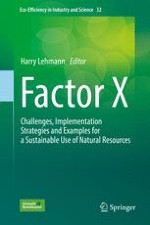2018 | OriginalPaper | Buchkapitel
31. Pope Francis’ Encyclical Laudato Si’ as a Catalyst for Societal Transformation? Critical Remarks and Presentation of an Inspired Exemplary Project as a Driver for Sustainability
verfasst von : Ulrich Bartosch, Christian Meier, Till Weyers
Erschienen in: Factor X
Aktivieren Sie unsere intelligente Suche, um passende Fachinhalte oder Patente zu finden.
Wählen Sie Textabschnitte aus um mit Künstlicher Intelligenz passenden Patente zu finden. powered by
Markieren Sie Textabschnitte, um KI-gestützt weitere passende Inhalte zu finden. powered by
